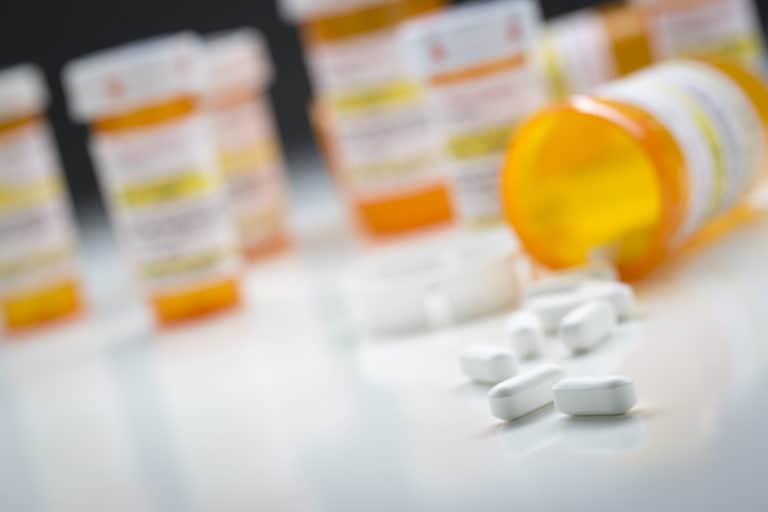
Yes. You can get a DWI on prescription drugs in Texas.
Is It Illegal to Drive While Using Prescription Drugs in Texas?
It is not illegal to drive if you are taking prescription medication. However, you must do so safely and meet these two essential conditions:
- You must have a legal prescription for the drug; and
- You do not meet the statutory definition for intoxication while driving.
The Texas Penal Code (TPC) defines intoxication as lacking the physical or mental capability to safely operate a motor vehicle due to alcohol, illegal drugs, controlled substances, or any other substance (including over-the-counter medications).
Thus, if an officer believes you cannot safely operate your vehicle because you took your medication, you can face drug DWI charges.
What Are the Penalties for a DWI on Prescription Drugs?
Texas penalizes a prescription drug DWI the same way the statutes criminalize an alcohol-related DWI. For a first offense, you will face Class B misdemeanor charges, which includes up to six months in jail, a $2,000 fine, and a potential one-year license suspension.
If you have prior convictions, or if the police can identify any aggravating circumstances related to your arrest, you will face charges that range from a Class A misdemeanor all the way up to a first-degree felony.
All DWI charges carry the threat of jail or prison time, significant fines, and a lengthy suspension of your driver’s license. You may also face additional court-ordered penalties including:
- Probation
- Community service
- Ignition interlock on your car,
- Educational courses, counseling, or rehab
Another serious consequence is a permanent criminal record. This can keep you from getting a good job, renting an apartment, getting into the school of your choice, or getting a student loan.
How Do the Police Prove Prescription Drug Intoxication?
To establish probable cause for an alcohol-related DWI arrest, police often administer field sobriety or breathalyzer tests. As most prescription medications will not show up on a breathalyzer test, law enforcement must use field sobriety tests for probable cause. These tests are subjective and often lead to false arrests.
Once they have arrested you, the police will likely request that you submit to a blood test. Although this type of chemical testing may not be able to identify the specific substance you consumed, it can provide enough information for the prosecutor to pursue charges.
The police and prosecutor can also use any statements you make against you in court. Simply admitting to the officer that you took an antidepressant, pain medication, sedative, or any prescription drug that you knew had certain side effects may be enough for the prosecutor to convict you of a drug-related DWI.
Can I Challenge a Prescription Drug DWI?
Yes. However, because proving drug-related intoxication presents a more significant challenge, a drugged driving lawyer may be critical in identifying weaknesses in the prosecution’s case that can help protect you from the consequences of a DWI.
For example, if the arresting officer violated your legal rights or failed to follow established protocols for administering a field sobriety test, your DWI lawyer may successfully use that information to negotiate with the prosecutor to have your drug DWI charges reduced or dismissed.
Some of the most common legal defense strategies our team uses for DWIs involving prescription drugs include:
Lack of reasonable suspicion: If the police did not have reasonable suspicion that you broke the law, they may have violated your rights by stopping your car. In that case, any subsequent evidence they obtain may be inadmissible in court.
Lack of probable cause: If the police failed to follow the field sobriety testing guidelines established by the National Highway Traffic Safety Administration (NHTSA), it could invalidate the results and potentially help get your drug DWI charges reduced or dismissed.
Faulty blood test results: The testing lab that obtains and processes your blood sample for drug testing must adhere to specific protocols and procedures. If the lab did not follow protocol, we may successfully argue that the test results could be erroneous.
The prosecutor has a burden of proof in a DWI with prescription drugs case. Nevertheless, many people wrongly go to jail for drug-related DWIs because they believe they had no grounds to challenge the charges.

How Can a Prescription Drug DWI Lawyer Help Me?
Randall Isenberg brings more than 30 years of experience in the Texas criminal justice system. Having worked as a chief felony prosecutor and a state judge, he brings unique insight and a profound understanding of the Texas legal system to your case.
Our team is ready to get to work to help you achieve the best possible outcome in your case.
If you are facing a DWI on prescription drugs, contact us today at 214-696-9253 to schedule a free consultation.










